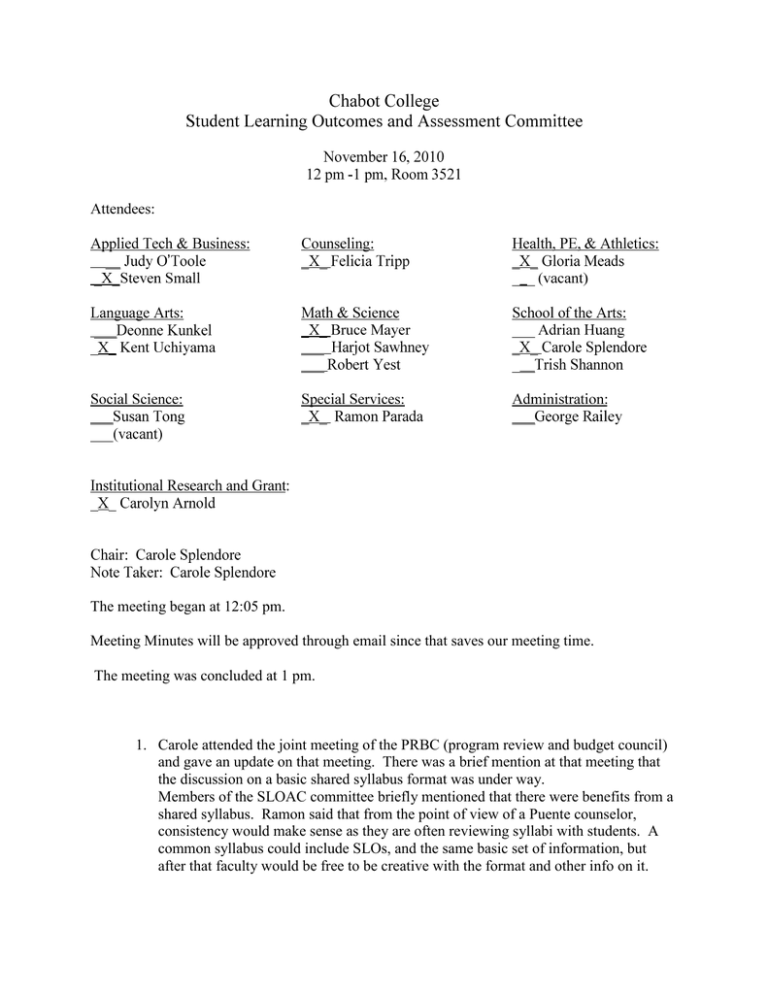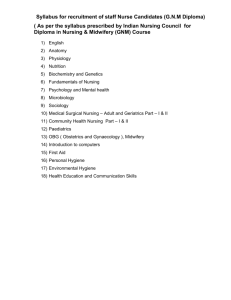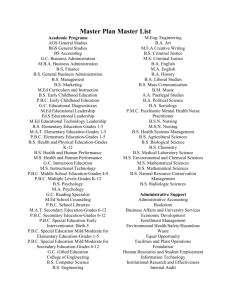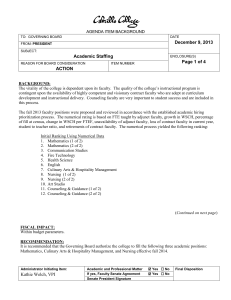Document 11502800
advertisement

’ The meeting began at 12:05 pm. Meeting Minutes will be approved through email since that saves our meeting time. The meeting was concluded at 1 pm. 1. Carole attended the joint meeting of the PRBC (program review and budget council) and gave an update on that meeting. There was a brief mention at that meeting that the discussion on a basic shared syllabus format was under way. Members of the SLOAC committee briefly mentioned that there were benefits from a shared syllabus. Ramon said that from the point of view of a Puente counselor, consistency would make sense as they are often reviewing syllabi with students. A common syllabus could include SLOs, and the same basic set of information, but after that faculty would be free to be creative with the format and other info on it. P age |2 2. We continued discipline check-ins, with information provided by the following members: A. Felicia: From her experience in Counseling, faculty were grouped into small groups working on SLOs for the same course(s). Most CLOs were written, for 13 of 19 courses. There were several all counseling meetings, some small group meetings, and an all-division eLumen training. Some courses were assessed in Spring ’10. Critical pieces to Counseling’s success were: Having the time carved out to do it (excused from division meetings) Having a point person for leadership and to send out reminders Meeting as a big group, then moving to small 3-person units B. Bruce: In Engineering, he is 99% sure the outcomes are up-to date. They/he writes outcomes when they are designing a new course. He gives outcomes and rubrics in class as guides to the wave-pool project. The two Engineering faculty make use of shared lab time to discuss outcomes and assessment. Critical pieces to Engineering’s success were: Keeping on top of outcomes by writing them with courses Sharing projects outcomes and rubrics with students Having the lab time to discuss outcomes C. Kent: ESL is on track with the SLO cycle. They are closing the loop on 110C and 110D this semester, the upper-level reading and writing courses. They started with 11A and 11B, the beginning reading and writing courses. 3 FT and 8 adjunct are coming to the various level meetings. Faculty rotate across courses, so both sets of faculty will participate in the level meetings. Critical pieces to ESL’s success were: The outcomes are not difficult to assess, % of correct verb tense use, etc. Having point persons per course Having level meeting for each of the course levels D. Ramon: Puente is part of Counseling, and the course PSCN 26 is about college success in the Chicano experience. Critical pieces to Puente’s success were: Getting the time they could meet Having the time honored as official, as an avenue for a Counseling Division meeting P age |3 Meeting as a big group, then moving to level meetings E. Gloria: In Nursing, what they measure is the clinical proficiencies, the theory is only measured by grades on a test, or on a paper perhaps. The faculty spend 1012 hours a week with the students, and go over a checklist of the clinical proficiencies or steps that must be done in order. The student has to get everything right, or they don’t pass the course. They also have a generic outcome for using the nursing process to care for a patient. Nursing has a 40-50% attrition rate, and they fill vacant spots quickly with others who have previously failed but are back, or transfers, or LVNs which are moving to the RN program. Students need to take Anatomy, Physiology, Microbiology, each with a lab, before they enter into the Nursing program. The right prerequisite could weed out those who could not succeed early. They have 600 qualified applicants for 60 spots each year. The IR dept. has worked with them and has found indicators of success: not repeating Anatomy, their GPA, passing English 1A. They want to have some standards, while also being fair to the other prospective students. They have Nursing Faculty meetings 1 – 2 times a month for three hours. They discuss: the program concerns, individual students, level concerns (such as if a certain % failed a test). Next Meeting 3. The next meeting will be on January 18th in room 3521. We will hear from the Staff Development Committee regarding March Flex day, and review “what worked” in our Disciplines, and prioritize our Committee goals for the Spring semester.



